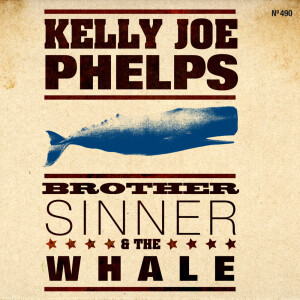 Kelly Joe Phelps has gone back to the well and emerged with a deeply satisfying album of deeply spiritual songs. Brother Sinner And The Whale is Phelps’s 10th album since his 1994 debut Lead Me On on Portland, Oregon’s independent Burnside label. That disc drew critical praise for his technically proficient and highly creative lap-style slide guitar playing and his songwriting chops, as did his 1997 major-label debut Roll Away The Stone and its popular follow-up, Shine Eyed Mister Zen, both on Rykodisc. Since then he has kept up a regular touring schedule, put out an EP with folksinger Corinne West, and provided his signature slide guitar sound on releases by the likes of Jay Farrar, Rory Block, Tim O’Brien, Greg Brown, Tony Furtado, Martin Simpson and others, in addition to his own recordings.
Kelly Joe Phelps has gone back to the well and emerged with a deeply satisfying album of deeply spiritual songs. Brother Sinner And The Whale is Phelps’s 10th album since his 1994 debut Lead Me On on Portland, Oregon’s independent Burnside label. That disc drew critical praise for his technically proficient and highly creative lap-style slide guitar playing and his songwriting chops, as did his 1997 major-label debut Roll Away The Stone and its popular follow-up, Shine Eyed Mister Zen, both on Rykodisc. Since then he has kept up a regular touring schedule, put out an EP with folksinger Corinne West, and provided his signature slide guitar sound on releases by the likes of Jay Farrar, Rory Block, Tim O’Brien, Greg Brown, Tony Furtado, Martin Simpson and others, in addition to his own recordings.
Along the way, according to the materials that accompany Brother Sinner in print and on Phelps’s website, the musician suffered a spiritual crisis, which he has assuaged with a Christian commitment that is reflected in the album’s songs. The sentiments and themes are similar to those on his previous gospel-inflected album, Roll Away The Stone, but the playing and writing both ring with great depth and maturity.
It’s not a solemn or preachy affair, by any means. For one, Phelps has challenged himself musically by turning to traditional bottleneck-style slide guitar playing on this album, rather than his usual lap-style approach (in addition to several songs on which he plays in a fretted fingerpicking style). And that picking frequently demonstrates great wit, on songs such as the album opener “Talking To Jehova,” whose celebratory lyrics are wed perfectly to the song’s catchy, bluesy melody.
In places, Phelps has created modern songs that sound like modern arrangements of traditional gospel numbers, such as “Goodbye To Sorrow,” “Hope In The Lord To Provide” and “The Holy Spirit Flood.” The delightful “Sometimes A Drifter” is a folk hymn in a lilting waltz-time tune with echoes of Phelps’s recording of Leadbelly’s classic “Goodnight Irene.” The lyrics, though, sound like an autobiographical tale of Phelps’s own spiritual quest.
Elsewhere, Phelps produces his own take on actual old hymns, including the traditional “I’ve Been Converted” (a staple of bluesman Mississippi Fred McDowell and the Blind Boys of Alabama) and the Welsh hymn “Guide Me O Thou Great Jehova.” But he also gives us some songs that are in his own signature vein, bluesy songs with intricate fingerpicking or slide playing and lyrics that are a touch more complex and symbolic than your average hymn or praise song. “Pilgrim’s Reach” is a sinner’s cry for mercy, “Down To The Praying Ground” a deeply bluesy meditation on redemption, and “Hard Time They Never Go Away” with its contemporary folk structure, blues chords and symbolic but personal lyrics:
Cold, long and weary; the winter’s gone dead.
Busted up ol’ overcoat, coverin’ my head.
One more season of tryin’ to lay it down. ”
Damn ol’ life,” I mumble, to no one around.
Top it off with two fleet and melodic instrumentals, “Spit Me Outta The Whale” and “Brother Pilgrim,” and you have what I think is Kelly Joe Phelps’s most accessible album to date. The recording, by Steve Dawson, was done in just three days, and the sound reflects that immediacy and urgency. The lyrics have pretty specific Christian meanings, but the sentiment and the playing are universal. For evidence, take a look at this video of “Down To The Praying Ground.”
(Black Hen, 2012)
